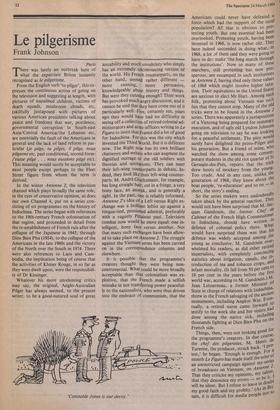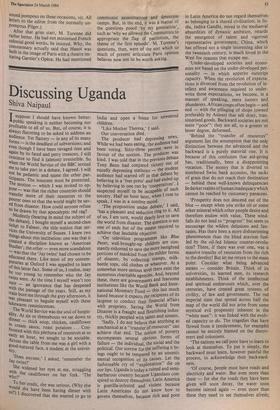Le pilgerisme
Frank Johnson
Paris /There was lately an outbreak here of what the expatriate Briton instantly recognised as le pilgerisme.
From the English verb `to pilger', this ex- presses the continuous action of going on the television and suggesting at length, with pictures of napalmed children, victims of death squads, mushroom clouds, etc, (skilfully juxtaposed with pictures of various American presidents talking about peace and freedom) that war, pestilence, governmental corruption in South-east Asia/Central America/the Lebanon etc, are essentially the fault of the Americans in general and the lack of land reform in par- ticular (je pilge, to pilges, it pilge, nous pilgeons etc, past conditional, second form: j'eusse pike . . . nous eussions pilge etc). This meaning would surely be acceptable to most people except perhaps to the Fleet Street figure from whom the term is derived.
In the winter Antenne 2, the television channel which plays broadly the same role, in the eyes of conservative opinion, as does our own Channel 4, put on a series con- sisting of six programmes on the history of Indochina. The series began with references to the 19th-century French colonisation of that region, and proceeded in detail from the re-establishment of French rule after the collapse of the Japanese in 1945, through Dien Bien Phu (1954), to the collapse of the Americans in the late 1960s and the victory of the North over the South in 1974. There were also references to Laos and Cam- bodia, the implication being of course that the activities of Khmer Rouge, in so far as they were dwelt upon, were the responsibili- ty of Dr Kissinger.
Whatever his more unrelenting critics may say, the original, Anglo-Australian Pilger has always seemed, to the present writer, to be a good-natured soul of great
amiability and much unsubtlety who simply has an extremely unconvincing version of the world. His French counterparts, on the other hand, seemed rather different more cunning, more persuasive, knowledgeable about history and things. But were they cunning enough? Their work has provoked much angry discussion, and it cannot be said that they have come out of it particularly well. Five, certainly ten, years ago they would have had no difficulty in seeing off a collection of retired colonial ad- ministrators and army officers writing to Le Figaro to insist that France did a lot of good for Indochina. For this was the city which invented the Third World. But it is different now. The Right now has its own brilliant chatterers and writers who can augment the dignified outrage of the old soldiers with theories and quotations. They can meet their left-wing counterparts in debate. In- deed, they look like their left-wing counter- parts. M. Andre Glucksmann, for example, has long straight hair, cut in a fringe, a very bony face, an anorak, and is generally a sight. In the past, one is reliably informed, Antenne 2's idea of a Left versus Right ex- change was a brilliant leftist up against a tongue-tied, pensioned admiral, preferably with a vaguely Petainist past. Television combat now would be more equal: one in- telligent, bony face versus another. Not that many such exchanges have been allow- ed to take place on Antenne 2. The struggle against the Vietnam series has been carried on in the correspondence columns and elsewhere.
It is possible that the programme's creators thought they were being non- controversial. What could be more broadly acceptable than that colonialism was ex- ploitive, that the French made a selfish mistake in not transferring power peaceful- ly to the nationalists, who were thus driven into the embrace of communism, that the `Constable Jones is our decoy.'
Americans could never have defeated a force which had the support of the rural population? All that is obvious to pro- testing youth. But one essential had been overlooked. Protesting youth, having been invented in 1968, is now rather old. They have indeed succeeded in doing what, in 1968, a lot of them said they were going to have to do: make 'the long march through the institutions'. Now so many of these marchers, still protesting but now pro- sperous, are encamped in such institutions as Antenne 2, having shed only those values of 1968 which might involve higher taxa- tion. Their equivalents in the United States are anxious to elect Mr Hart. Among such folk, protesting about Vietnam was such fun that they cannot stop. Many of the old tricks were to be found in the Antenne 2 series. There was apparently a juxtaposition of a Vietcong being prepared for summary execution, and of ugly old Lyndon Johnson going on television to say he was looking for a peaceful settlement. The ploy would surely have delighted the proto-Pilger and his generation. But a friend of mine, who watched the show among some contem- porary students in the old riot quarter of St Germain-des-Pres, reports that the trick drew hoots of mockery from the young. Too crude. And in any case, unlike the generation of 1968, they knew about the boat people, 're-education' and so on — in short, the story's ending.
So the series makers were undoubtedly
taken aback by the general reaction. They would not have been surprised that M. Jac- ques Gandouin, the former Chef de Cabinet of the French High Commissione r to Indochina, should have written to defence of colonial policy there. What would have surprised them was that his defence was widely accepted among the young as conclusive. M. Gandouin over- whelmed his readers, as did other retired imperialists, with completely convincing statistics about irrigation, canals, the in- troduction of tea and tobacco crops, and infant mortality. (It fell from 50 per cent to 19 per cent in the years before the first world war, according to M. Gandouin.) Jean Letourneau, a former Minister 01 State in charge of relations with Indochina, threw in the French salvaging of the ancient monuments, including Angkor Wat. Even- tually, a retired nurse came forward to
.
testify to the work she and her sisters had done among the native sick, including thousands fighting at Dien Bien Phu on the French side. Things, then, were not looking good for
the programme's creators. In due course, the chef des pilgeristes, M. Henri de Turenne, the producer, struck back. q pro- test,' he began. 'Enough is enough. For a_ month Le Figaro has made itself the echo of an unrestricted campaign against my series 2 of broadcasts on Vietnam, on Antenne t- That they criticise my opinions, talent, that that they denounce my errors — so be it- l will be silent. But I refuse to leave in doubt
i
my good faith and my probity.' (As in Bri- tain, it is difficult for media people not to sound pompous on these occasions, viz. All letters to the editor from the normally un- pompous Pilger.)
After that grim start, M. Turenne did rather better. He had not minimised French colonial good works, he insisted. Why, the commentary actually said that Hanoi was built in the image of Paris with a theatre im- itating Garnier's Opera. He had mentioned communist assassinations and detention camps. But, in the end, it was a matter of the questions posed 'by my generation', such as 'why we allowed the Communists to appropriate the flag of patriotism, the theme of the first episode'. M. Turenne's questions, then, were of the sort which so much of present articulate Paris opinion believes now not to be worth asking.











































 Previous page
Previous page